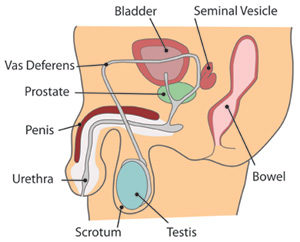Reduced numbers or quality of sperm
In at least 25% (a quarter) of couples attending an infertility clinic there is a problem with the man’s sperm. This can range from a minor to a major problem. An example of a major problem would be the complete absence of sperm (Azoospermia) in a sample whereas a minor problem might be a slightly below average sperm count. It is important to realise that many of the more minor problems with sperm are not necessarily a bar to pregnancy but reduce the chances of it happening.
There are many different reasons for this including:
- Partial blockage of the sperm ducts Partial blockage of the sperm ducts (vas deferens) leading from the testicles to the penis. This can result in both reduced numbers and quality of sperm.
- Hormonal problems FSH, LH and testosterone are all essential for sperm production in men. Sometimes there is an imbalance in the levels of these hormones and sperm number and quality deteriorates. This can occasionally be treated by hormone injections.
- Testicles overheating Temperature is very important for sperm production. In order to produce sperm the testicles have to be more than one degree cooler than the rest of the body (This is why the testicles are situated outside the body). Modern lifestyle and clothing can lead to the testicles overheating and a subsequent reduction in sperm count. In some men this can be reversed by wearing loose fitting underwear (e.g. boxer-shorts), taking showers instead of hot baths and trying not to spend too much time seated during the day.
- Varicocele This is a varicose vein on, or close to, the testicles. It is thought that this affects the temperature of the testicles and therefore sperm production. This condition can sometimes be treated by surgery and may improve the quality of sperm, although success rates are low.
- Drinking and smoking Drinking excessive amounts of alcohol has an adverse effect on sperm count and quality. Excessive alcohol intake is more than 28 units a week (14 pints). Smoking affects the ability of sperm to penetrate the egg and therefore can prevent pregnancy.
General advice which may improve quality of sperm
- If you are a regular alcohol drinker then try to cut down or eliminate your drinking.
- If you smoke then give up.
- Try not to overheat your testicles by taking hot baths, wearing tight underwear/trousers or remaining seated for long periods of time.
- If you are overweight or generally unfit try to lose weight and improve your general level of fitness; there is evidence of a link between general health and sperm quality.
- Eat healthily, i.e. plenty of fruit and vegetables in a balanced diet. Taking vitamin and mineral supplements, especially vitamins A,C and E and the minerals Zinc and Selenium can be beneficial.
- Care should, however, be taken not to overdose as some vitamins and minerals can be harmful in large quantities. It is also important that fat intake be controlled.
Treatment Options
A very low sperm count, low sperm motility or poor morphology (physical appearance) will usually mean that you must have In-Vitro Fertilisation (IVF) or Intra-Cytoplasmin Sperm Injection Treatment (ICSI). If you have a very severe problem then it may even be necessary to use donor sperm in treatment (Donor Sperm Intra-Uterine Insemination- DIUI).
Detailed information is available about these treatments on the IVF, ICSI and DIUI pages.
Male infertility checklist
Patients should remember that:
- Having a lower than average sperm count does not necessarily mean that you cannot achieve a natural pregnancy, but it may take longer.
- Improving general health i.e. reducing stress levels, cigarettes and alcohol are all important.
- Assisted conception techniques such as In-Vitro Fertilisation (IVF) and Intra-Cytoplasmin Sperm and Injection Treatment (ICSI) give couples a realistic chance of a pregnancy when a male factor is responsible for their infertility.
- Donor sperm or adoption are also an option, but these require careful consideration and counselling.
